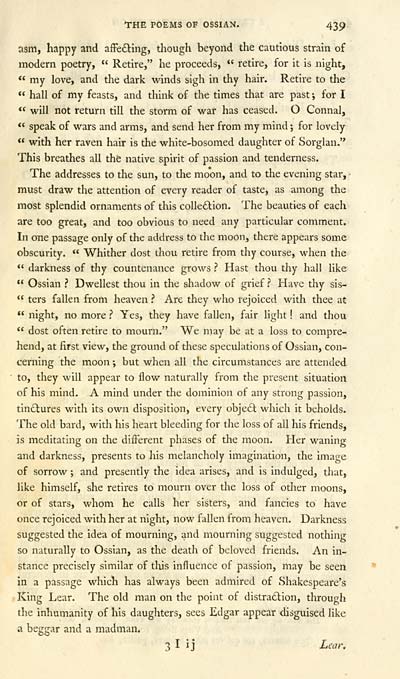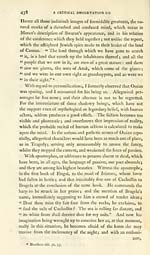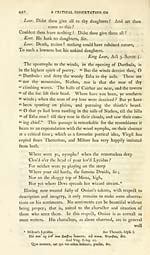Download files
Complete book:
Individual page:
Thumbnail gallery: Grid view | List view

THE POEMS OF OSSIAN. 439.
asm, happy and affeding, tliough beyond the cautious strain of
modern poetry, « Retire," he proceeds, " retire, for it is night,
*« my love, and the dark winds sigh in thy hair. Retire to the
" hall of my feasts, and think of the times that are past ; for I
*' will not return till the storm of war has ceased. O Connal,
*< speak of wars and arms, and send her from my mind ; for lovely
*' with her raven hair is the white-bosomed daughter of Sorglan."
This breathes all the native spirit of passion and tenderness.
The addresses to the sun, to the moon, and to the evening star, ■
must draw the attention of every reader of taste, as among the
most splendid ornaments of this colle£lion. The beauties of each
are too great, and too obvious to need any particular comment.
In one passage only of the address to the moon, there appears some
obscurity. " Whither dost thou retire from thy course, when the
*' darkness of thy countenance grows ? Hast thou thy hall like
" Ossian ? Dwellest thou in the shadow of grief ? Have thy sis-
" ters fallen from heaven ? Are they who rejoiced with thee at
** night, no more .'' Yes, they have fallen, fair light ! and thou
** dost often retire to mourn." We may be at a loss to compre-
liend, at first view, the ground of these speculations of Ossian, con-
cerning the moon •, but when all the circumstances are attended
to, they will appear to flow naturally from the present situation
of his mind. A mind under the dominion of any strong passion,
tindures with its own disposition, every obje£l which it beholds.
The old bard, with his heart bleeding for the loss of all his friends,
is meditating on the different phases of the moon. Her waning
and darkness, presents to his melancholy imagination, the image
of sorrow ; and presently the idea arises, and is indulged, that,
like himself, she retires to mourn over the loss of other moons,
or of stars, whom he calls her sisters, and fancies to have
once rejoiced with her at night, now fallen from heaven. Darkness
suggested the idea of mourning, and mourning suggested nothing
so naturally to Ossian, as the death of beloved friends. An in-
stance precisely similar of tliis influence of passion, may be seen
in a passage which has always been admired of Shakespeare's
King Lear. The old man on the point of distra£lion, through
the inhumanity of his daughters, sees Edgar appear disguised like
a beggar and a madman.
3 I ij Lear,
asm, happy and affeding, tliough beyond the cautious strain of
modern poetry, « Retire," he proceeds, " retire, for it is night,
*« my love, and the dark winds sigh in thy hair. Retire to the
" hall of my feasts, and think of the times that are past ; for I
*' will not return till the storm of war has ceased. O Connal,
*< speak of wars and arms, and send her from my mind ; for lovely
*' with her raven hair is the white-bosomed daughter of Sorglan."
This breathes all the native spirit of passion and tenderness.
The addresses to the sun, to the moon, and to the evening star, ■
must draw the attention of every reader of taste, as among the
most splendid ornaments of this colle£lion. The beauties of each
are too great, and too obvious to need any particular comment.
In one passage only of the address to the moon, there appears some
obscurity. " Whither dost thou retire from thy course, when the
*' darkness of thy countenance grows ? Hast thou thy hall like
" Ossian ? Dwellest thou in the shadow of grief ? Have thy sis-
" ters fallen from heaven ? Are they who rejoiced with thee at
** night, no more .'' Yes, they have fallen, fair light ! and thou
** dost often retire to mourn." We may be at a loss to compre-
liend, at first view, the ground of these speculations of Ossian, con-
cerning the moon •, but when all the circumstances are attended
to, they will appear to flow naturally from the present situation
of his mind. A mind under the dominion of any strong passion,
tindures with its own disposition, every obje£l which it beholds.
The old bard, with his heart bleeding for the loss of all his friends,
is meditating on the different phases of the moon. Her waning
and darkness, presents to his melancholy imagination, the image
of sorrow ; and presently the idea arises, and is indulged, that,
like himself, she retires to mourn over the loss of other moons,
or of stars, whom he calls her sisters, and fancies to have
once rejoiced with her at night, now fallen from heaven. Darkness
suggested the idea of mourning, and mourning suggested nothing
so naturally to Ossian, as the death of beloved friends. An in-
stance precisely similar of tliis influence of passion, may be seen
in a passage which has always been admired of Shakespeare's
King Lear. The old man on the point of distra£lion, through
the inhumanity of his daughters, sees Edgar appear disguised like
a beggar and a madman.
3 I ij Lear,
Set display mode to: Large image | Transcription
Images and transcriptions on this page, including medium image downloads, may be used under the Creative Commons Attribution 4.0 International Licence unless otherwise stated. ![]()
| Early Gaelic Book Collections > Ossian Collection > Poems of Ossian, the son of Fingal > (451) |
|---|
| Permanent URL | https://digital.nls.uk/77928796 |
|---|
| Description | Selected books from the Ossian Collection of 327 volumes, originally assembled by J. Norman Methven of Perth. Different editions and translations of James MacPherson's epic poem 'Ossian', some with a map of the 'Kingdom of Connor'. Also secondary material relating to Ossianic poetry and the Ossian controversy. |
|---|
| Description | Selected items from five 'Special and Named Printed Collections'. Includes books in Gaelic and other Celtic languages, works about the Gaels, their languages, literature, culture and history. |
|---|

